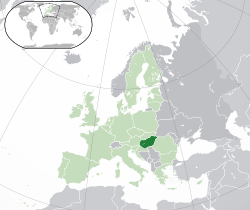LGBT rights in Hungary
| LGBT rights in Hungary | |
|---|---|
 Location of Hungary (dark green) – in Europe (light green & dark grey) | |
| Same-sex sexual activity legal? |
Legal since 1961, age of consent equalized in 2002 |
| Gender identity/expression | Gender change is legal. |
| Military service | Gays, lesbians and bisexuals allowed to serve |
| Discrimination protections | Sexual orientation and gender identity protections (see below) |
| Family rights | |
| Recognition of relationships |
Unregistered cohabitation since 1996, Registered partnerships since 2009 |
Restrictions: | Same-sex marriage constitutionally banned |
| Adoption | No joint adoption by same-sex couples; no adoption of same-sex partner's child |
The rights of lesbian, gay, bisexual, transgender (LGBT) people in Hungary have evolved through Hungarian history. Homosexuality is legal in Hungary for both men and women. Discrimination on the basis of sexual orientation and gender identity is banned in the country. However, households headed by same-sex couples are not eligible for the same legal rights available to opposite-sex married couples. Registered partnership for same-sex couples was legalized in 2009.
Law regarding same-sex sexual activity
The first Hungarian Penal Code by Károly Csemegi (1878) punished homosexuality between men ("természet elleni fajtalanság" – unnatural perversion) with prison up to 1 year. Homosexual activity above the age of 20 was decriminalized in 1961, then above the age of 18 in 1978 by the new Penal Code. The age of consent, which is 14, has applied equally to heterosexual and homosexual activity since a Constitutional Court decision of 2002. Gay and bisexual people are not banned from military service.
Recognition of same-sex relationships
Unregistered cohabitation has been recognised since 1996. It applies to any couple living together in an economic and sexual relationship (common-law marriage), including same-sex couples. No official registration is required. The law gives some specified rights and benefits to two persons living together. Unregistered cohabitation is defined in the Civil Code as "when two persons are living together outside of wedlock in an emotional and financial community in the same household, provided that neither of them is engaged in wedlock or partnership with another person, registered or otherwise, and that they are not related in direct line, and they are not siblings." Inheritance is possible only with testament, widow-pension is available for couples cohabiting for more than 10 years.
On 17 December 2007, the Parliament adopted a registered partnership bill submitted by the Hungarian Socialist Party-Alliance of Free Democrats Government. The bill was found unconstitutional by the Constitutional Court because it duplicated the institution of marriage for opposite-sex couples. In February 2009, the Parliament approval a modified version of the bill. Since 1 July 2009, same-sex couples can enter into registered partnerships. The law gives the same rights to registered partners as to spouses except for adoption, assisted reproduction or taking a surname.[1][2]
On 1 January 2012, a new constitution enacted by the Government of Viktor Orbán, leader of the ruling Fidesz party, came into effect, restricting marriage to opposite-sex couples and containing no guarantees of protection from discrimination on account of sexual orientation.[3] Note, however, that discrimination on the basis of sexual orientation remains banned through interpretation of the general non-discrimination provision in the constitution, as well as by the Equal Treatment Act.
Adoption and family planning
Although same-sex couples cannot adopt jointly, adoption by individuals is legal regardless of sexual orientation or partnership status. Second parent adoption is only available for married (different sex) couples.
Access to IVF and donor insemination is available for single women regardless of sexual orientation, but not available for lesbians cohabiting or in a registered partnership with their same-sex partners.
Discrimination protections

In 2000, the Constitutional Court recognized that the constitutional ban on discrimination based on "other status" covers sexual orientation as well. There exists an anti-discrimination law in the Act on Public Health since 1997. The 2003 Act on Equal Treatment and the Promotion of Equal Opportunities forbids discrimination based on factors that include sexual orientation and gender identity in the fields of employment, education, housing, health, and access to goods and services.
Gender identity and expression
Transgender people living in Hungary can change their legal gender. They still have to get a diagnosis, but they don't have to go through hormone therapy or mandatory sex reassignment surgery. The Equal Treatment Act specifically includes gender identity among the list of protected characteristics.
Blood donation
Gay and bi men are allowed to donate blood following a 12-month deferral period.[4]
Living conditions
Hungary was the host country of Mr Gay Europe 2007 contest and the Eurogames in 2012.
Budapest Pride was the first such event in the former Eastern Bloc, and draws a steady, but moderate number of LGBT people and their supporters. The LGBT festival lasts a week every summer with a film festival, a pride march and parties across the city. The festival was opened in the past by notable public figures including Gábor Demszky, then Mayor of Budapest, and Kinga Göncz, then Minister of foreign affairs.
Freedom of speech and expression
In 2012, Jobbik MP Adam Mirkoczki introduced a constitutional amendment to the Parliament seeking to ban "the promotion of sexual deviations". The amendment would punish the "promotion of homosexuality or other disorders of sexual behaviour" with up to 8 years in prison. LMBT Federation, a Hungarian LGBT advocacy group, protested against the amendment and called on Parliament to reject it. The Democratic Coalition also voiced their opposition and called it "mean and shameful".[5] The amendment ultimately failed to pass.
In November 2016, the small Hungarian town of Ásotthalom passed a law banning "gay propaganda", Muslim call to prayer and Muslim clothing. The Mayor called on Christians locals to support a "holy war on Muslims and multiculturalism".[6] In April 2017, after a lawsuit challenging the ban was filed, the Constitutional Court struck down the ban, ruling that it violated human rights law as it aimed to "limit directly the freedom of speech, conscience and religion".[7]
Public opinion
Polls reflecting popular opinion on gay marriage in Hungary have shown a mixed picture.
According to a Eurobarometer survey published on December 2006, only 18 percent of Hungarians surveyed supported same-sex marriage, and only 13 percent recognized a same-sex couple's right to adopt, compared to the EU-wide average of 44 percent and 33 percent, respectively.[8] However, a poll conducted a year after in 2007 indicated that 30 percent of the Hungarian public supported same-sex marriage.[9]
The Eurobarometer poll taken in 2015 suggested 39% of Hungarians support same-sex marriage. The most recent poll by Pew Research Center published in May 2017 suggests that 27% of Hungarians are in favor of same-sex marriage, while 64% oppose the idea. Support was higher among non-religious people (34%) and 18–34 year olds (39%), in contrast to Catholics (25%) and people aged 35 and over (23%).[10]
In May 2015, PlanetRomeo, a LGBT social network, published its first Gay Happiness Index (GHI). Gay men from over 120 countries were asked about how they feel about society’s view on homosexuality, how do they experience the way they are treated by other people and how satisfied are they with their lives. Hungary was ranked 49th with a GHI score of 47.[11]
Summary table
| Same-sex sexual activity legal | |
| Equal age of consent | |
| Anti-discrimination laws in employment | |
| Anti-discrimination laws in the provision of goods and services | |
| Anti-discrimination laws in all other areas (incl. indirect discrimination, hate speech) | |
| Same-sex marriage | |
| Recognition of same-sex couples | |
| Stepchild adoption by same-sex couples | |
| Joint adoption by same-sex couples | |
| Gays, lesbians and bisexuals allowed to serve in the military | |
| Transgender people allowed to serve in the military | |
| Right to change legal gender | |
| Commercial surrogacy for gay male couples | |
| Access to IVF for lesbians | |
| MSM allowed to donate blood | |
See also
- "Mások" ("Others", monthly Hungarian LGBT magazine)
- List of gay-rights organizations#Hungary
- LGBT rights in Europe
References
- ↑ "Hungary approves partnership legislation". pinknews.co.uk. 18 December 2007. Retrieved 16 March 2008.
- ↑ "Hungary legalizes same-sex civil partnerships". Reuters. 18 December 2007. Retrieved 16 March 2008.
- ↑ "New Hungarian constitution comes into effect with same-sex marriage ban," PinkNews, 3 January 2012, accessed 6 January 2012.
- ↑ Three decades of MSM donor deferral policies. What have we learned?
- ↑ Jobbik submits amendment aimed at banning "gay propaganda"
- ↑ This Small Hungarian Town Has Banned 'Gay Propaganda' to Become a Far-Right Refuge
- ↑ Hungarian court overturns village's ban on Islamic symbols and 'LGBT propaganda
- ↑ "Eight EU Countries Back Same-Sex Marriage". Angus Reid Global Monitor. 24 December 2006. Archived from the original on 15 March 2008. Retrieved 16 March 2008.
- ↑ "Hűvös fogadtatás: Közvélemény a homoszexuálisok megítéléséről" (in Hungarian). Medián. 11 July 2007.
- ↑ "Religious Belief and National Belonging in Central and Eastern Europe". Pew Research Center. Retrieved 11 May 2017.
- ↑ The Gay Happiness Index. The very first worldwide country ranking, based on the input of 115,000 gay men Planet Romeo
External links
| Wikimedia Commons has media related to LGBT in Hungary. |
- Social visibility and acceptance of LGBT people in Hungary
- Budapest GayGuide.Net Up2date GayGuide for Budapest and Hungary
